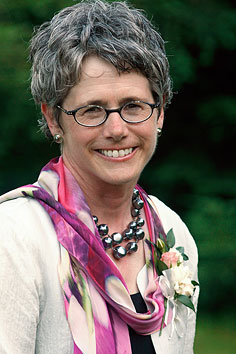
A Shot in the Arm for HIV Vaccine Development
Alumna Peggy Johnston Tackles Global Health Challenges
by Jennifer Bails

It was already late evening in California, but Margaret “Peggy” Johnston (S’72) didn’t hesitate to call Dr. Anthony Fauci, director of the National Institute of Allergy and Infectious Diseases (NIAID) at the National Institutes of Health, back on the East Coast.
“Tony, grab a piece of paper and pencil—you’re going to want to write this down,” Johnston told Fauci. “And you are going to want to sit down.”
A statistician had just revealed the findings of the largest HIV/AIDS vaccine trial to date, a double-blind study costing nearly $100 million and enrolling more than 16,000 subjects in Thailand. As assistant director for vaccine research and director of the Vaccine Research Program at NIAID, Johnston played a key leadership role in the design, implementation and oversight of the trial.
And to her excitement, the vaccine had reduced by nearly a third the risk of contracting HIV—a modest, but statistically significant benefit. It was the first proof-of-concept that an HIV vaccine could prevent disease in humans. “I looked at my colleagues, and we got tears in our eyes,” she recalls.
It was a landmark moment for Johnston, who has been at the forefront of the hunt for an HIV vaccine—one of the most challenging public health problems in medical history—for the past 25 years.
The daughter of a steelworker and homemaker, Johnston was the first in her blue-collar family from Pittsburgh’s industrialized Mon Valley to attend college. She was one of just a few women to graduate in 1972 from Carnegie Mellon with a degree in chemistry.
She went on to earn her Ph.D. in biochemistry from Tufts University, and in 1982, joined the biochemistry faculty at the Uniformed Services University of the Health Sciences in Bethesda, Maryland.
Around that time, a mysterious, deadly epidemic was terrifying the nation, and in particular, the homosexual population. “I’m gay, and AIDS was a disease that was hitting my community. I wanted to do something about it,” she says. “From a research perspective, it seemed challenging and interesting and different.”
Johnston moved to the National Institutes of Health, where she shifted from the laboratory into a science management role, holding positions of increasing responsibility. She became deputy director of the NIAID’s Division of AIDS in 1993.
“I always thought I’d go to grad school and get a lab and teach students and fight for grant money,” she says. “But I realized that wasn’t the most fun for me. So I took a side road into science policy and planning—basically figuring what needs to happen and how to get it to happen.”
Ultimately, she led NIAID’s extramural HIV vaccine research grant and contract programs totaling more than $250 million a year to support vaccine discovery, preclinical evaluation and development and clinical research. The driving, but elusive goal: a safe, effective and accessible HIV vaccine for global use.
“What could be better than to find a vaccine to prevent the world’s deadliest infectious disease?” she asks. “I knew I couldn’t do it myself, but I’d rather be a small cog tackling a big problem than a big cog tackling a small problem.”
Certainly, Johnston proved to be anything but a small cog at NIAID, where she earned an international reputation for her tireless work toward the eradication of HIV, as well as her ingenuity and integrity.
“When a safe and effective HIV vaccine is developed, the world will owe Peggy a huge debt of gratitude for the leadership, commitment and wisdom that she passionately and selflessly has given to advance the HIV vaccine field,” wrote her colleagues in a statement upon her retirement from NIAID in 2010.
A year later, Johnston accepted a position as senior program officer at the Bill & Melinda Gates Foundation in Seattle, where today she focuses on both tuberculosis and HIV vaccines. It’s an opportunity to think more broadly about infectious disease control and prevention, particularly in developing countries.
“My job here at the foundation is much more at the grassroots level, interacting with grantees thinking beyond the science of vaccine development to issues like, can we afford a particular vaccine, what is the market share, who can deliver it, how can it get to the people who really need it,” she says.
This fall, Carnegie Mellon honored Johnston with an Alumni Distinguished Achievement Award for her global contributions and for being a role model to the university’s graduates. “For anyone to be recognized by their alma mater is an honor,” she says. “But I feel particularly fortunate because Carnegie Mellon has such an outstanding reputation in the sciences.”
Johnston has returned to Carnegie Mellon in recent years to share her story and dream with the world’s future scientists and leaders. “I told them that they could be the generation that could stop AIDS,” she says. “We have one vaccine, but it’s not good enough. I hope I live long enough to see it happen.”